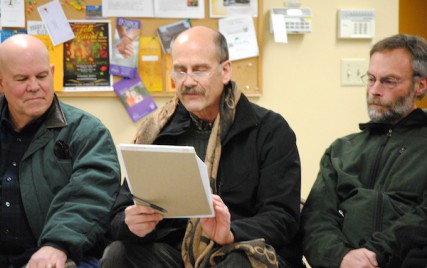
Physician assisted suicide has been legal in Washington, Oregon and Montana for some years now, but the ethical dilemmas surrounding the law continue to be a struggle for many Americans.
At its monthly meeting Wednesday night, members of the Friends of Compassion discussed those dilemmas, including the ways faith plays a role in euthanasia.
The group, made of about 30 people, started the conversation by remembering Dan Treecraft, a Spokane resident and blogger who chose suicide over cancer treatment. Treecraft died two years ago after breathing from a cylinder of nitrogen gas. His friends and family supported his decision.
John Hancock, director of Friends of Compassion, said in his experiences, most people who choose euthanasia are those who don’t practice a particular faith.
Daya Goldschlag, who leads Zen meditation classes locally, said she was surprised people who didn’t practice a faith would be more willing to commit suicide than those who believe in a God waiting on the other side to embrace them.
Perhaps, some in the group said, that’s because most religions — particularly Christianity — fear God’s retribution if one takes his or her own life.
Others questioned whether euthanasia was a selfish way to exit the earth.
The Rev. Joe Neimiec Jr. said regardless of the religious viewpoints on the issue, people who choose to end their own lives deserve to be honored with a funeral on sacred ground.
“A lot of churches refuse to hold services on hallowed ground if someone commits suicide,” he said.
He added that family members left behind also need to be cared for by the faith community and/or friends and loved ones.
The group also mostly agreed that assisted suicide should be a family decision, not just a decision left to the person who is ill.
The question whether assisted suicide is moral or immoral, though, remained unclear.
Hancock said he views this life a continuous journey and getting old or sick is part of that journey.
“I think the soul has longer than just this life,” he said. “The soul is on this journey of understanding pleasure. Pain, suffering and getting old, losing my health and losing my intellect is part of that journey…Cutting off that last part of the journey short circuits the last opportunity to learn.”
The discussion was part of an ongoing series on aging. The next meeting will focus on, “After We're Gone, Then What?” and will be held on Feb. 20.
For information contact [email protected].






I was at the meeting and I am not sure that there really was any general agreement about the right of the family to have any say in a family members decision to take their own life. Some felt it was offensive for a family member to leave without permission especially if there was undelivered communication pending but I saw heads nodding when I said, “…once communication was allowed to flow freely the issue of suicide would become much less important.”
I had some occasional association with Dan Treecraft and I think he would probably have agreed that any person should have the exclusive right to decide about their own suicide regardless of other family members’ opinions. I should add that I found him to be a very friendly and engaging guy.
Thanks for your comments Jeremy, you’re right not everyone agreed – I didn’t mean to imply that all were on the same page.
After reading the article, as a Bible believing Christian, I don’t believe anyone is going to hell because they commit suicide. There may be some mis-informed Christians who don’t do it because of that idea, but I believe it is mostly because we believe God is the Sovereign King over our lives, and we would be playing our own little god to take our lives before He brought us home Himself. The sad and frightful thing about suicide is that according to Scripture the moment of death (which is not anhiliation but separation of spirit and body) does set one’s destiny for eternity. Purgatory or any other such false doctrine made up by men falsely leads people to believe otherwise.
The difference between Christians and non-Christians is that we would believe that this life, no matter how painful, is just a breath of time compared to the rest of eternity, where every living soul will exist in heaven or in hell. The reason many athiests and agnostics find it easier to commit suicide is because they don’t believe this.